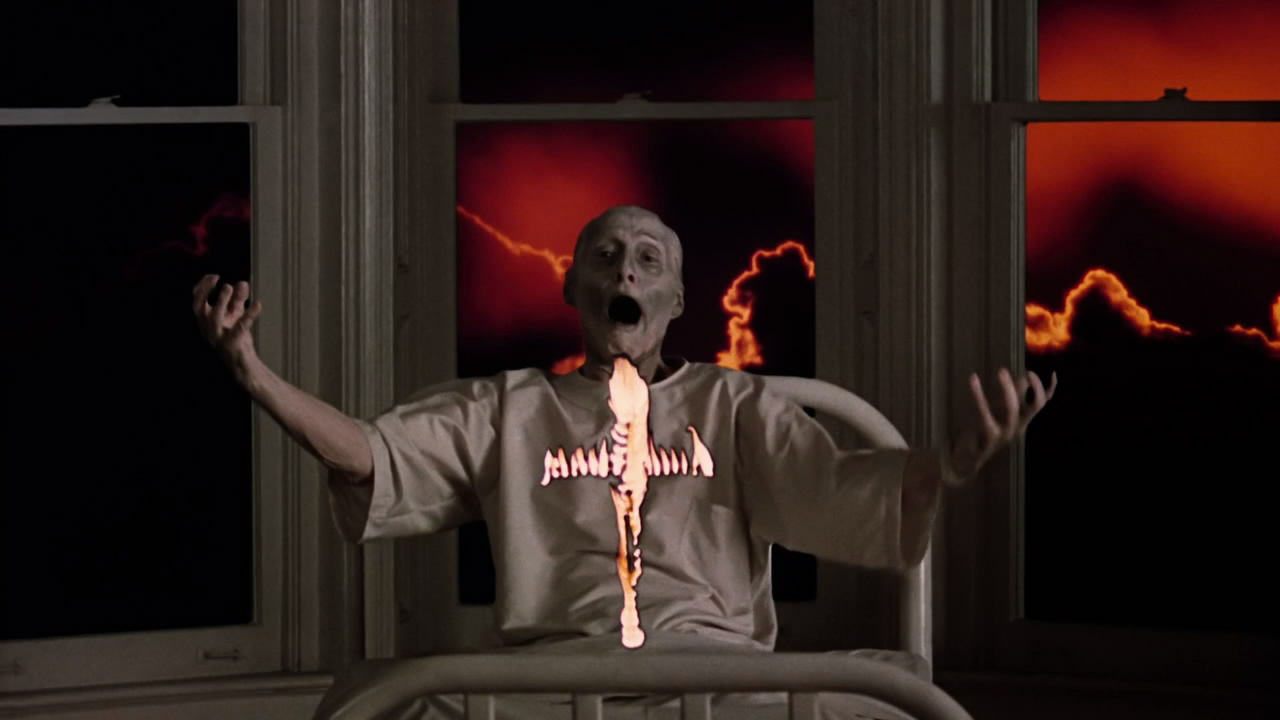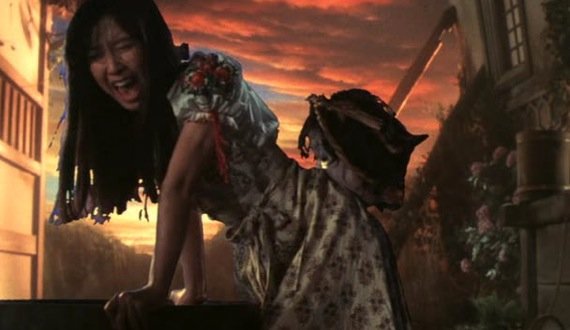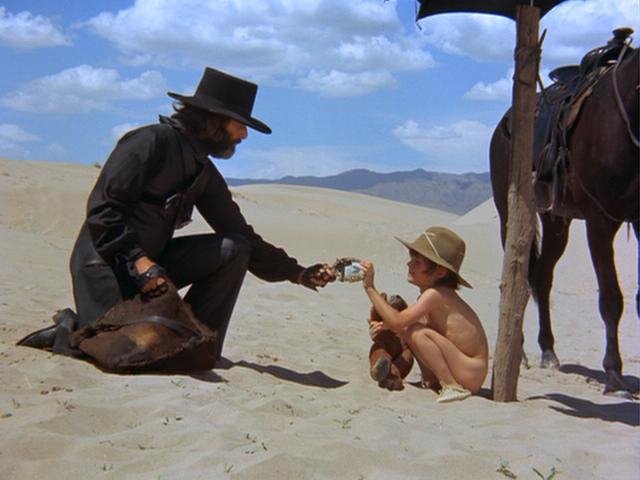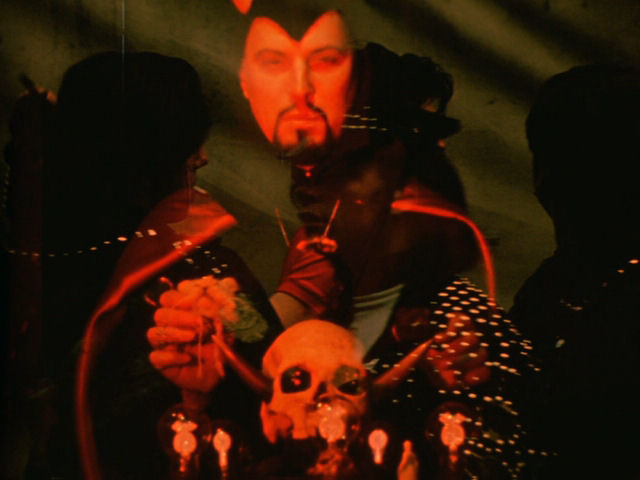5. Altered States (1980)

The psychedelic experience has played a large role in the formation of neo-occultism as a way of describing the nature of reality as a dualistic sort of entity in of itself. Ken Russell’s Altered States from 1980 is an adaptation of Paddy Chayefsky’s 1978 novel of the same name.
Both the film and the novel were inspired by the work of John C. Lilly, a neuroscientist whose work dealt with the impact and influence of altered states of consciousness on the human mind.
The central crux of the film deals with a psychologist, Eddie Jessup (William Hurt) who begins to believe that altered states of consciousness (such as dreams, drug induced hallucinations, etc.) are perhaps just as “real” as our waking lives.
Jessup partakes in various experiments (with drugs, ceremonies and isolation tanks) which lead to varied hallucinations of becoming different beings. He becomes obsessed with continuing his experiments, though they become to become frightening. Throughout his experiences, he begins to develop an appreciation for his humanity and the integration of his consciousness.
Though not explicitly concerned with occult, the film does deal with what Crowley termed the “ultimate joy of life”:
“The joy of life consists in the exercise of one’s energies, continual growth, constant change, the enjoyment of every new experience. To stop means simply to die. The eternal mistake of mankind is to set up an attainable ideal.”
By experiencing different states of consciousness, Jessup is able to experience the enjoyment of experience which allows himself to re-integrate his humanity and his analytical intellect.
4. House (1977)

Nobuhiko Obayashi’s House from 1977 is another psychedelic trip into the realm of the occult. Here, we’re presented with a fairly typical ghost story of a haunted house that is wracked with the remnants of painful memories of loss in the midst of the haze of post-WWII Japan.
However, the focus of the film is not on the ghosts themselves, but rather what influence memories can have on someone. The film’s outline was proposed by Obayashi’s young daughter, and has been described as “surreal” by Obayashi himself. The spectres of memories are important here as depictions of the occult in that they are the ways by which we seek to create our identities. Crowley wrote:
“This True Self thus ultimately includes all things soever”
In House, we could interpret each of the protagonists as a sort of portion of one whole identity which are split up until the point they are killed by the “House” in a sort of metaphysical sacrifice of duality for the sake of a monistic identity that includes all parts of a person’s consciousness. It’s a sort of realization that all parts contribute to the greater person.
House is a perfect depiction of the notion that experience and memory can form or confirm an identity.
3. El Topo (1970)

Jodorowsky’s El Topo is another film that deals with an overt general occult influence, but it is however linked to Thelema by its synthesis of Eastern Religious themes, Christian symbolism and its adherence to a sort of humanism that is expressed by Jodorowsky’s exploration of moralism as it is defined in the context of social benefit and the subsumption of classic archetypes into a apotheotic narrative.
Apotheosis and enlightenment are both central tenets in Thelema, and Jodorowsky depicts this sort of individual progression into enlightenment as a transitory experience that is lived through years.
It’s an acknowledgement that spiritual development can only come from thoughtful introspection (El Topo sleeping for years in a mountain) and careful reorientation of one’s thoughts, priorities and the integration of various experiences into one consciousness by means of metaphysical, physical and psychic preparation. In essence, it’s the eschewing of prior existence in hopes that our experiences can become reconciled against a greater sense of purpose or psychological unity.
2. Invocation of my Demon Brother (1969)

Invocation of my Demon Brother is Kenneth Anger’s response to his earlier film, Lucifer Rising. Composed of unused material from Lucifer it’s notable due to its focus on the depiction of actual Thelemic ritual rather than interpretations of theology. It’s score was composed by Mick Jagger, oddly enough, and it fits well with the theme of the film, providing a sort of voyeuristic view of the insides of Thelemic practice.
It’s not as cryptic as other Anger films, and remains slightly tongue-in-cheek, which is odd for Anger, as his films are generally serious in tone. It’s playful, yet dark and explores the various practices of Thelema from a day-to-day perspective, rather than a grand statement of its aims/traditions, etc.
It’s not a typical occult film and for this reason, it may be even more valuable for those interested in studying or learning of the influence of the occult in the latter half of the past century. Rather than personifying the philosophies and theologies of the religion as these sorts of arcane mythic figures, Anger attempts to humanize them and deal with them in a more personal way.
In a way, it still remains cryptic in that the moments are immediately explained to the audience in a way that can be read with historical knowledge of Thelema or the neo-occult practices that were pervasive in the earlier 20th century.
1. Dionysus in ‘69 (1970)

Brian de Palma’s Dionysus in ‘69 is an adaptation of a 1968 theatrical performance, which in of itself was an adaptation of Euripides’ The Bacchae, at Greek tragedy written by the ancient playwright.
The Bacchae concerns Dionysus and the story of his origin. It’s notable in that it deals with the nature of human experience as it pertains to our relationship with the divine. As opposed to Abrahamic theology, the Greeks emphasized the imperfections of their deities and their relationship as part of human experience rather than a divine authority that supersedes the agency of humanity.
This is relevant to Thelema in that Dionysus is a central figure in Thelemic theology. Crowley wrote extensively about the nature of Dionysus as a force for the syncretic nature of humanity and its environment. Dionysus (referred to as Bacchus), is referred to as an analogue for Christ by Rabelais, and Crowley himself once wrote:
“The legend of ‘Christ’ is only a corruption and perversion of other legends. Especially of Dionysus: compare the account of Christ before Herod/Pilate in the Gospels, and of Dionysus before Pentheus in ‘The Bacchae’.”
In a sense, de Palma’s film could serve as an entry point in an attempt to understand Thelemic theology and philosophy. In this way, the film could be used as a form of analysis for these ideas and the underpinnings of Thelema itself.
Author Bio: Alan is a writer, musician and composer from Calgary, Canada. His short fiction has been previously published in L’Allure des Mots out of Miami FL. His music can be found on Spotify and iTunes.